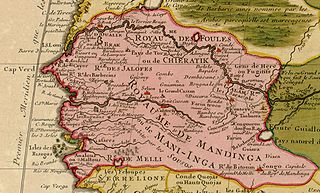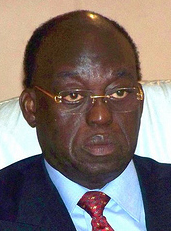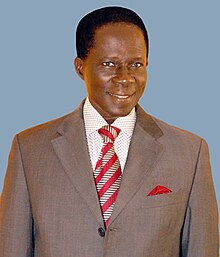
The history of Senegal is commonly divided into a number of periods, encompassing the prehistoric era, the precolonial period, colonialism, and the contemporary era.

Abdou Diouf is a Senegalese politician who was the second President of Senegal, in office from January 1981 to April 2000.

Macky Sall is a Senegalese politician who has been President of Senegal since April 2012. He was re-elected President in the first round voting in February 2019. Under President Abdoulaye Wade, Sall was Prime Minister of Senegal from July 2004 to June 2007 and President of the National Assembly from June 2007 to November 2008. He was the Mayor of Fatick from 2002 to 2008 and held that post again from 2009 to 2012. Sall was a long-time member of the Senegalese Democratic Party (PDS). After coming into conflict with Wade, he was removed from his post as President of the National Assembly in November 2008; he consequently founded his own party named the Alliance for the Republic (APR) and joined the opposition. Placing second in the first round of the 2012 presidential election, he won the backing of other opposition candidates and prevailed over Wade in the second round of voting, held on 25 March 2012. He is the first president born after Senegalese independence from France.

Moustapha Niasse is a Senegalese politician and diplomat who has been President of the National Assembly from 2012 until 2022. He served in the government of Senegal as Foreign Minister of Senegal from 1978 to 1984 and again from 1993 to 1998. He was Prime Minister of Senegal for a few weeks in 1983, and he held that position again from 2000 to 2001.

Cheikh Anta Diop University, also known as the Cheikh Anta Diop University of Dakar, is a university in Dakar, Senegal. It is named after the Senegalese physicist, historian and anthropologist Cheikh Anta Diop and has an enrollment of over 60,000.
The And-Jëf/African Party for Democracy and Socialism is a socialist political party in Senegal led by Landing Savané.
Father Augustin Diamacoune Senghor was a Catholic priest and a leading figure in the Casamance independence movement from Senegal. He served as director of the Saint-Louis of Ziguinchor Seminary from 1972 until 1975.
Landing Savané is a Senegalese politician and the secretary-general of And-Jëf/African Party for Democracy and Socialism.
Djibo Leyti Kâ was a Senegalese politician and the Secretary-General of the Union for Democratic Renewal (URD). He was a prominent minister under President Abdou Diouf from 1981 to 1995 and founded the URD in 1998 after splitting from Diouf's Socialist Party (PS). From 2004 to 2012, he again served in the government under President Abdoulaye Wade, initially as Minister of State for Maritime Economy and then as Minister of State for the Environment beginning in 2007. Man of the state, he then was appointed Minister under Macky Sall's government before becoming the Director of the CNDT.
Iba Der Thiam, also known as I. D. Thiam, was a Senegalese writer, historian, and politician. He served in the government of Senegal as Minister of Education from 1983 to 1988; later, he was First Vice-President of the National Assembly of Senegal from 2001 to 2012.
Demba Diop was a Senegalese politician. He served as Minister of Youth and Sport under President Léopold Sédar Senghor and was Mayor of Mbour from 1966 until his assassination.
Trade unionism is a powerful force in the politics, economy, and culture of Senegal, and was one of the earliest trades union movements to form in Francophone West Africa.

Presidential elections were held in Senegal on 26 February 2012, amidst controversy over the constitutional validity of a third term for incumbent president Abdoulaye Wade. In the runoff on 25 March, Macky Sall defeated the incumbent president. The 2015 documentary film Incorruptible chronicles both campaigns as well as the youth movement Y'en a Marre, which led protests against Wade's administration.

Women in Senegal have a traditional social status as shaped by local custom and religion. According to 2005 survey, the female genital mutilation prevalence rate stands at 28% of all women in Senegal aged between 15 and 49.

Joof or Diouf is a surname that is typically Serer. This surname is also spelt Juuf or Juf.
Abdoul Mbaye is a Senegalese banker and politician who was Prime Minister of Senegal from April 2012 until September 2013. He is a technocrat who was appointed prime minister by President Macky Sall following the latter's win in the 2012 presidential election.
This is a timeline of the history and development of Serer religion and the Serer people of Senegal, The Gambia and Mauritania. This timeline merely gives an overview of their history, consisting of calibrated archaeological discoveries in Serer countries, Serer religion, politics, royalty, etc. Dates are given according to the Common Era. For a background to these events, see Roog, Serer religion, Serer creation myth, Serer prehistory, Lamane, States headed by Serer Lamanes, Serer history and Serer people.

The patronym Faye is one of the typical surnames of the Serer people of Senegal, the Gambia and Mauritania. In French-speaking Senegal and Mauritania, and English-speaking Gambia, the surname is spelled Faye.
Events in the year 2020 in Senegal.

Senegalese nationality law is regulated by the Constitution of Senegal, as amended; the Nationality Law, and its revisions; and various international agreements to which the country is a signatory. These laws determine who is, or is eligible to be, a national of Senegal. The legal means to acquire nationality, formal legal membership in a nation, differ from the domestic relationship of rights and obligations between a national and the nation, known as citizenship. Nationality describes the relationship of an individual to the state under international law, whereas citizenship is the domestic relationship of an individual within the nation. Senegalese nationality is typically obtained under the principal of jus sanguinis, i.e. by birth in Senegal or abroad to parents with Senegalese nationality. It can be granted to persons with an affiliation to the country, or to a permanent resident who has lived in the country for a given period of time through naturalization.










